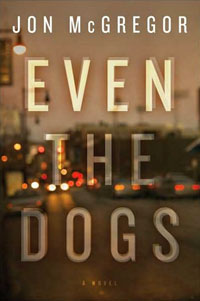If this book were a person it would be your rambling Uncle Reggie with all the skeletons in his closet, you know the relative with a genius level IQ and possibly undiagnosed schizophrenia, the guy that drank it all away and then showed up at Christmas to start a fight. Nobody really likes to be around Uncle Reggie, because he reminds them how fragile the balance of mental health and life, but in reality at the end of the day when you are quiet with just your thoughts, even you have got to admit that Uncle Reggie is far more interesting than all the rest of your relatives combined. At the start of Even The Dogs, is the death of a homeless man, Robert, a person found on a day between Christmas and New Year’s inside an abandoned apartment building. The fictional story that arises out of this sad event is more real than most. What follows is a makeshift eulogy, a strange remembrance of the pitiful man who died, as told by his friends and acquaintances. The key here is the friends and acquaintances. They are each homeless addicts living on the fringes of society, drugged and searching for drugs, drying out and then checking into rehab and then relapsing again. Their remembrances are heartfelt to be sure, but also dreamy, nebulous, frantic, rushed, interrupted, disjointed, confused, urgent, pressured and half forgotten. “Had to find someone and tell them was all he could think. Had to find Laura and let her know, had to find Mike.” We are told Robert had a daughter named Laura and her father’s friends speculate where she might have gone, until the end of the novel when she is forced to reveal, at an inquest, that she abandoned her father to score drugs.
Even The Dogs is an odd novel at first to get into and slightly off-putting with strange use of punctuation and rambling sentences and the continuous use of the pronoun “we.” And yet, if you stick with it and invest yourself fully, by the end of the book all of these stylistic devices truly make sense. In fact, not unlike a drug, when you let this novel fully wash over you, the brilliance of it hits and you are left in awe. Jon McGregor’s latest tale appeared with much advance praise and buzz about the Booker prize and yet it is a difficult read. It is one of the more deceptive reads I’ve been given lately for review here at brainfood. The style is very evocative of the Virginia Woolf school of stream-of-consciousness and this reminded me a great deal of some of the duty reads from university English literature classes of years gone by. At first it left me cold and then I realized that was partly the point. You are supposed to feel hot and cold about the topic matter at hand and the death of a homeless drunk is really not poetry to most. He will be given a pauper’s funeral and his friends wonder at the sadness and hopelessness at the end of this lifeMcGregor is a stylist of the highest calibre and a writer’s writer for sure. Here we will find sentences paused mid-thought, punctuation dropped or forgotten, mishmashed grammar and rambling odd rants about life on the street. McGregor’s characters have strong voices and his talent for dialect is nothing, if not realistic. McGregor has also written If Nobody Speaks of Remarkable Things and So Many Ways To Begin. He has won the Somerset Maugham Award and The Betty Trask Prize. He was born in Bermuda and now lives in England.
thriftymommastips rating $$$$ out of $$$$$
Not for everyone, but realistic, highly intelligent and brave writing.
Bloomsbury USA New York, 2010, $17.50 Canada. $14 US.
